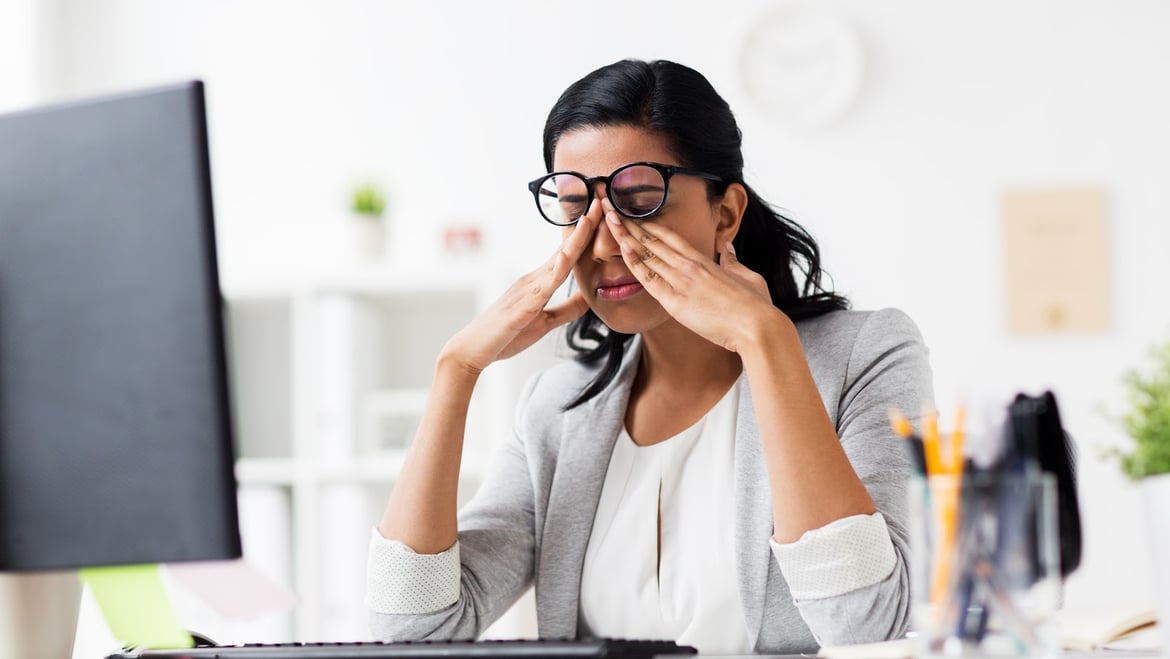
Why You Should Stop Rubbing Your Eyes
When your eyes are tired or itchy, nothing feels better than giving them a good rub. Rubbing your eyes stimulates tear flow that lubricates the eye’s surface and removes dust or other irritants. It also stimulates your vagus nerve, which lowers your heart rate and relieves stress.
Sadly, everything that feels good isn’t always good for us, and this is true for eye rubbing. Not only can touching your eyes transfer viruses and bacteria from your hands, the action of rubbing can potentially damage your delicate eye tissues.
What triggers the urge to rub your eyes?
Dry eye, allergies, and eye fatigue are some of the most common reasons we rub our eyes. The act of rubbing the eye releases tears and oils from glands in the eye lids, vital moisture that helps relieve dry eye symptoms. Stimulating tear flow can also rinse away allergens that may be irritating the eye.
Staring at a computer or tablet screen for too long can cause digital eye fatigue and dryness. Most of us respond subconsciously to eye strain by trying to rub it away. While occasional, gentle eye rubbing is unlikely to cause any harm, frequent or aggressive eye rubbing can be a problem.
What kinds of damage can eye rubbing cause?
Rubbing your eyes can cause minor and major eye issues. Some of the most common include:
- Conjunctivitis (pink eye) from germs on your hands.
- Scratched cornea from trying to rub away a foreign object (it’s better to flush it out with saline solution or artificial tears).
- Keratoconus, a condition where rubbing makes the cornea thin and weaken into a cone-like shape. This is a serious condition that can lead to distorted vision.
- Retinal tears and detachments, caused by increased eye pressure from aggressive rubbing.
People who have certain pre-existing eye conditions are more susceptible to damage from eye rubbing. If you have glaucoma, your eye pressure is already high and rubbing will exacerbate the condition, possibly resulting in nerve damage and permanent vision loss. If you have progressive myopia (short-sightedness from having eyeballs that are more football-shaped than spherical) rubbing can worsen your eyesight.
From a purely cosmetic perspective, eye rubbing can break tiny capillaries beneath the thin skin around the eyes, causing or exaggerating under-eye shadows. Repeated eye rubbing can also cause the eyelids to become saggy over time.
Tips to Stop Rubbing Your Eyes
Eye rubbing is something most of us do without thinking, so it can be a tricky habit to break. Additionally, rubbing allergic eyes releases more histamine, which makes the symptoms worse. However, following these tips can keep your eyes safe from rubbing damage.
- Use artificial tears or saline eye drops to keep your eyes well-lubricated. Storing eye drops in the refrigerator makes them feel even more soothing.
- If allergies are a problem, ask Dr. Matzkin or Dr. Herron if prescription eye drops may help. Certain drops include antihistamines, steroids, or mast cell stabilizers that lessen the trigger to rub your eyes.
- Avoid triggers like smoke and strong cleaning chemicals that you know will irritate your eyes.
- Take screen breaks every 20 minutes or so.
- Dip a washcloth in warm water, wring it out, and use it as a warm compress to soothe itchy eyes.
- Don’t wear makeup if your eyes are feeling irritated.
- Make a conscious effort to keep your hands away from your eyes.
If you’re struggling to control eye rubbing, or you are concerned that you might have damaged your eyes, call or text us today at (423) 855-8522 to make an appointment for a comprehensive eye exam. Our friendly and professional staff will help you resolve any potential issues related to rubbing your eyes—or any other ophthalmological concerns you may have!

